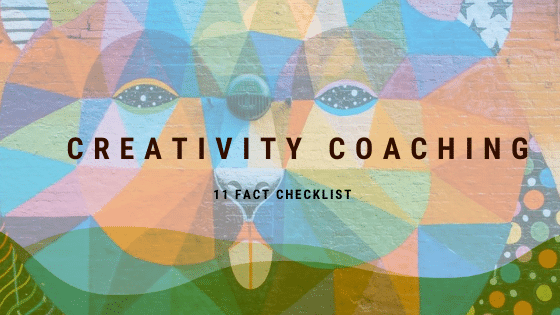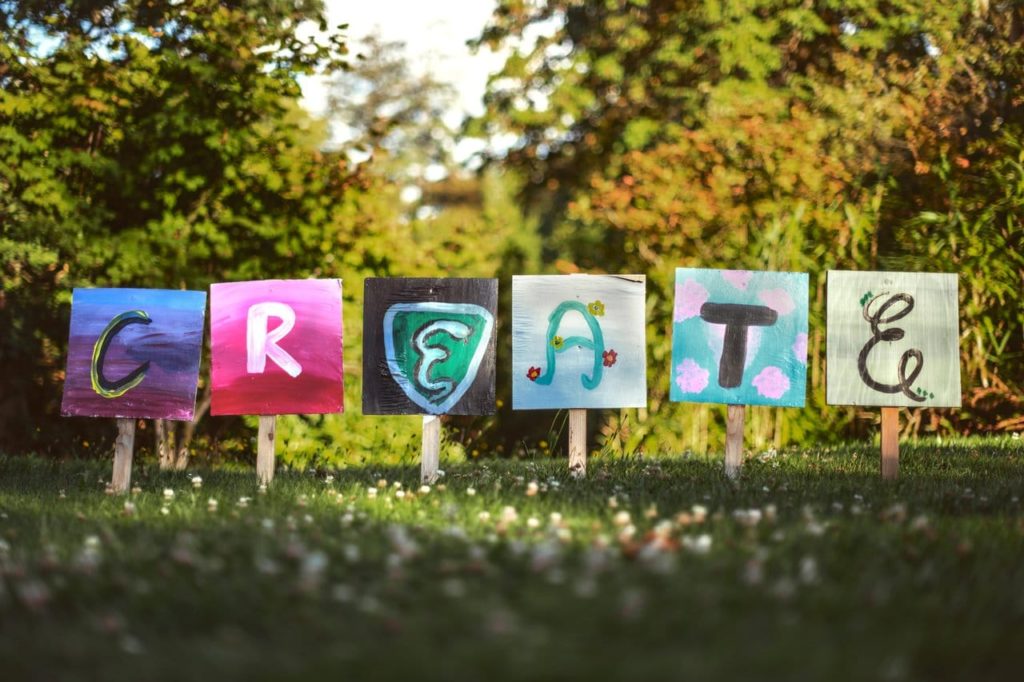Do you consider yourself a creative?
Awesome!
Because today, you’re going to learn about one of the ways you can supercharge your creativity.
Creativity coaching
Specifically, you’ll learn how a creativity coach can help you tap into your creative juices and develop your humanistic and artistic talents.
Here’s what you’ll learn:
Let’s get right into it!

#1. What is Creativity Coaching?
Creativity coaching is like any other form of coaching. It mainly aims at helping an individual improve his or her life.
However, unlike life coaching, creativity coaches mainly focus on your creative works.
This specialized form of coaching is designed to help creatives navigate the inevitable bumps that come up when creating something new.
#2. But What is Creativity?
Creativity is a broad term. It means different things to different people. However, a general description would be to consider it as the process of generating new ideas, alternatives, or possibilities to solve a problem.
Everything around you is a result of creative work.
The music you listen to is a result of the creative process; the lovely poem that made your day is a result of creativity; even your smartphone is a result of creative work.
#3. What Do Creativity Coaches Do?
Think about the most creative people you know.
How did they achieve all their great works?
If you look carefully, these people had a sort of support system; a mentor, or simply someone who always cheered them on.
This is what a creativity coach does.
He/ she works with you to help you achieve your creative ambitions. Your coach provides you with the tools, techniques, and support you need to help you tap into your creative potential and overcome creative blocks.
In short, creativity coaches help you manifest your creative potential.
But why do I need a coach?
#4. Why Do People hire Creativity Coaches?
Coming up with a new idea, product, or strategy isn’t easy.
It’s a path riddled with challenges, setbacks, and other constraints. Most people give up or end up feeding as if they’re not enough.
However, with a creativity coach, navigating these bumps becomes much easier.
And this is why people hire creative coaches.
You’re likely to hire a creative coach to help you get through creative blocks, burnout, and the anxiety that comes when trying to balance expectations and what you want to create.
Some of the people likely to work with creativity coaches include
- Artists looking to feel more confident about their creative process
- Writers looking to remain motivated through long writing sessions
- Entrepreneurs and executives looking to promote creativity in their teams.
- Anyone suffering from creative anxiety.
#5. Benefits of Creativity Coaching
One of the main benefits of having a creative coach is that he or she guides you through the process of setting and achieving your creative goals. If this isn’t met, coaching is considered to have failed.
Some of the other ways you benefit from hiring a creativity coach include:
Allow you to connect with your true nature.
One of the roles of a creative coach is to help you express yourself most authentically.
To achieve this originality, your coach designs a series of exercises to help you connect with your inner self.
Helps you to Develop a Fresh Perspective
Creativity coaches work with you to eliminate any negative patterns and create positive habits to supercharge your creativity.
The introduction of these positive habits doesn’t only affect your creativity but also improves your overall well-being.
Help you Discover Unidentified Talents.
A creative coach’s main job is to help you reach your full creative potential.
This is achieved by pushing you to work beyond your limits and perform your best. In the process, you may discover a hidden talent, or rediscover old forgotten talents.
Other benefits include
- Improved inner confidence
- Increased energy
- Better sleep
- Improved intuition
- A reawakened enjoyment of life’s little pleasures.

#6. Creativity Coaching Process
Creativity coaching takes a step by step approach to helping clients. Some of the steps involved in the process include
Assessment
Initial coaching sessions entail a detailed evaluation of the client.
During this stage, your coach will ask questions to better understand your creative ambitions and the challenges that keep you from achieving them.
This assessment also gives the coach an idea of your personality and helps him to refine his technique based on your needs.
Setting Goals
What is it you want to accomplish?
- Are you looking to finally start writing that book you’ve wanted to write for so long?
- Perhaps you’re looking to improve your creative process.
- Or maybe you just want the confidence to go to the studio and record a song.
A creative coach will help you set and define your goal. He or she will also help you come up with a plan to help you achieve your goals.
During coaching, your coach will also come up with a series of exercises to ensure steady progress.
Identifying Blind spots
As you work on the various exercises aimed at achieving your goals, your coach will identify elements that block your creativity.
On most occasions, you won’t notice your limiting beliefs. However, a coach will help you identify any creative blocks and help you overcome them.
Tips and Tricks
Once your coach identifies some of the issues keeping you from achieving your full creative potential, he’/ she then provides you with the tools to help you overcome these blocks.
In this stage of coaching, the coach helps you create new habits aimed at improving your creativity. The coach also offers tips on how you can set up an atmosphere that inspires creativity.
What other techniques can a creativity coach use?
#7. Creativity Coaching Techniques
To help you overcome your creative blocks, your coach is likely to use several techniques. Some of the most common include:
Non-Violent Communication
Also known as compassionate communication, this coaching technique requires a coach to remain empathetic to the client.
Rather than letting ego get in the way of the communication process, a creativity coach employs empathy and honest self-expression to help you connect with and share your creativity.
Cognitive Behavioral Therapy
Like any other form of coaching, creativity coaches help you dispel negative thought patterns and replace them with more positive habits.
One of the most effective ways of achieving this is through cognitive behavioral therapy. When coaching for creativity your coach will likely use this approach, especially during the “identifying blind spots stage.”
Hypnotherapy
Hypnotherapy can help creatives in multiple ways.
A coach may decide to use hypnosis to help you gain better focus as well as explore abstract ideas.
Hypnotherapy can also be used to deal with creative anxiety, and some of the effects that come with it—when creating something new, insomnia is common.
Art Therapy
One of the best ways of unlocking your creative potential is by creating art.
Yes!
Drawing, coloring, sculpting, or creating collages provide a useful tool for self-expression, which results in unlocking your creative potential.
And that’s not all!
If you suffer from creativity anxiety, art therapy can help.
“What if I want to become a creativity coach?”
Keep reading to learn more…
#8. Becoming a Creativity Coach
Like other life coaching programs, creativity coaching is a non-regulated industry.
Anyone with a domain name and some internet marketing skills can pose as a creativity coach. But that’s not you. You’re not a quack.
You want to differentiate yourself from the rest of the herd. Some of the ways to do this include
Get Training
You wouldn’t go to a doctor who’s not qualified, right? Why then would you want to coach someone without receiving the necessary training and accreditation?
The first step to becoming a creativity coach is getting the right training.
Getting training not only helps you to establish credibility but also helps you to gain the necessary skills to help your clients.
Specialize
To succeed as a creativity coach, it’s essential to define a niche.
Do you plan to work with writers, actors, artists, or musicians?
Depending on who you choose, your clients will expect you have some experience in their field. After selecting a niche, it’s advisable to learn extra skills to serve your clients better.
Create an Online Presence
There’s no compromise to this.
To become a successful creativity coach, you should have a robust online presence—one where you can reach clients from all over the globe.
To do this, you’ll need to create a website and promote your services on social media.
#9. Creativity Coach Certification
You may be wondering, “where’s the best place to get my creative coaching certification?”
Several institutions offer creativity coaching training and certifications.
However, before enrolling in any institution, make sure that the course is ICF accredited. Being an ICF accredited coach allows you to attract more clients and charge more for your coaching services.
Here’s a list of six highly recommended ICF-accredited life coach certification programs.
#10. What Skills are Needed to Become a Great Creativity Coach?
For you to suceed as a creativity coach, you’ll need to possess certain skills to help you better relate and work with different clients.
Some of the most essential skills include:
Communication Skills
One of the most essential skills required to become any type of coach is being able to communicate your ideas effectively and clearly.
And that’s not enough!
You also need to have deep listening skills. As a coach, you need to be able to listen beyond your client’s words. You need to know how to read your client’s body language and emotions.
Self Confidence
Another important skill required to become a great creativity coach is confidence in yourself.
When interacting with clients, you need to inspire confidence with your words and actions.
An Understanding of Human Psychology
Great creativity coaches have an understanding of human behavior and psychology.
Which is why you need to learn abit of human psychology before embarking on yor creativity coaching career. Doing so will help you to design your approach depending on the specific client.
Relationship building
To become an effective life coach, you need to create rapport between you and the client.
Being able to build relationships helps your clients to trust you with their deepest thoughts.
#11. Creativity Coach Salary
Studies suggest that creativity coaches earn an average of $80,000 per year.
However, this is just average. With the right training, positioning, and marketing, a creativity coach can earn an upwards of $130,000 a year.

Any Further Questions?
There you go.
All you need to know about creativity coaching.
Whether you’re looking to grow your creative potential, or want to launch your creative coaching business, I hope this guide has helped you get a clearer picture of what this specialized coaching entails.
If you have any further questions, please leave a comment below.
I’ll do my best to answer as many questions as possible.
Related Content
31 Types Of Coaching – A Complete List
Intuitive Coaching – 11 Facts Checklist
Art Therapy Near Me – A Complete Guide

